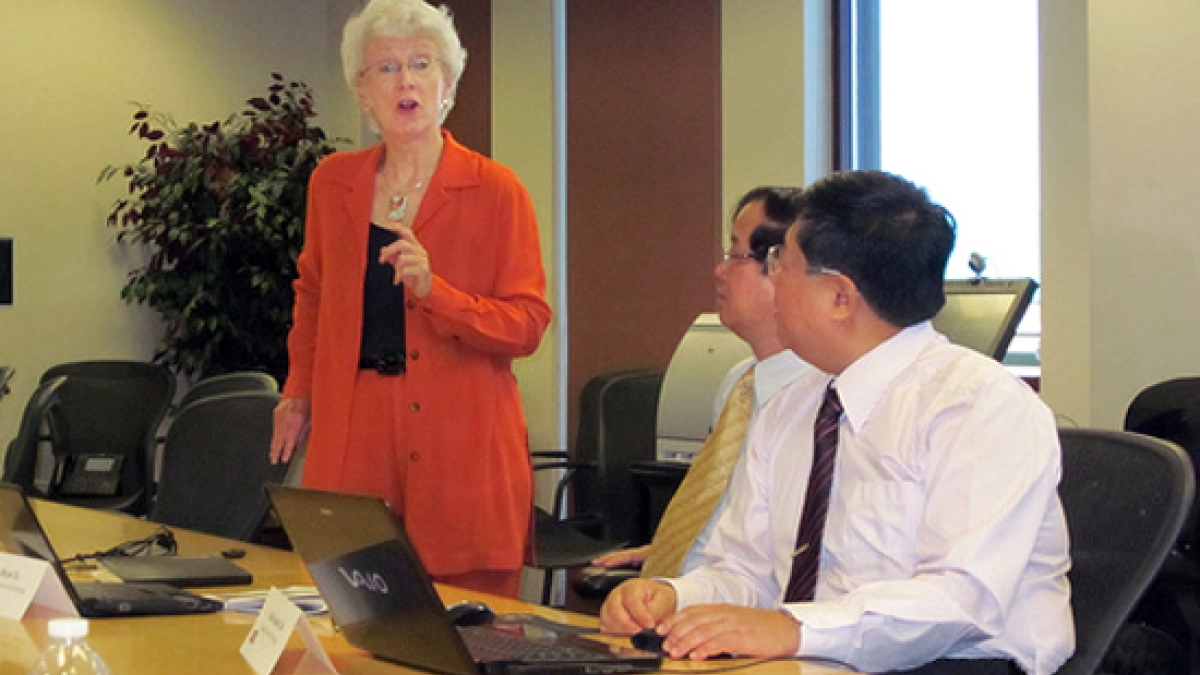ASU awarded $2.4M USAID grant to help strengthen higher ed in Vietnam

An ambitious higher engineering education initiative driven by Arizona State University to advance economic development efforts in Vietnam is continuing to attract support and build momentum.
A $2.4 million U.S. Agency for International Development (USAID) grant to ASU will expand the Higher Education Engineering Alliance Program (HEEAP) that leverages public and private sector funding to improve the quality of higher education in the country.
Through a partnership with Intel Corp., the Vietnam Ministry of Education and Training, the Ministry of Labor and Social Affairs and ASU, HEEAP seeks to help modernize higher education and prepare a more highly trained workforce to meet the increasing needs of global high-tech industries.
This USAID grant will support a new component of the HEEAP initiative. The Vocational and University Leadership and Innovation Institute (VULII) will provide capacity-building and training programs for Vietnamese university presidents and engineering school deans.
“Using an integrated approach, VULII will encourage leadership and innovation at the highest levels in conjunction with quality assurance at the delivery level,” said ASU professor Kathryn Mohrman, and principal investigator for VULII. “This is the best way to influence systemic change across institutions and across the tertiary education sector in Vietnam,” she added.
HEEAP was established in 2010 with funding support from USAID and Intel. Jeffery Goss, an assistant dean and executive director with ASU’s Ira A. Fulton Schools of Engineering is director of the program. To date, HEEAP has trained more than 100 faculty members from Vietnam's universities and colleges in advanced methods for teaching engineering.
“The framework of HEEAP will now evolve into five pillars: Faculty Development, Leadership Development, Technology in Education (Distance), Technical English, and Women in Technology and Engineering,” Goss said.
Mohrman, director of ASU’s University Design Consortium and a faculty member in the School of Public Affairs, will oversee the six major leadership development components for VULII:
• Quality Assurance Institute. Vietnamese universities cannot succeed at transformational change without a robust system of quality indicators integrated into institutional and departmental strategic plans.
• Rectors Leadership Institute. The success of VULII depends on the ownership of the reform process by the institutions themselves; transformational change cannot be imposed from the outside.
• Deans Leadership Institute. Annually, deans will be trained on developing strategic plans for their colleges and departments that are aligned to their rectors’ institutional plans and national education goals.
• Financial Management Institute. VULII will also hold annual one-week seminars in Vietnam for directors of budgeting and finance from each of the eight target campuses; the focus will be on modern methods of budget and finance, as well as implementation of the institution’s strategic plan.
• Faculty and Curriculum Development Institute. VULII resources will further support this core HEEAP focus by emphasizing institutional change strategies and providing the critical infrastructure necessary for continued enhancement of faculty and curriculum development efforts.
• Centers of Excellence will provide scalability through outreach, and will be accessible to anyone in Vietnam (or the world).
Mohrman said the participating rectors and deans will concentrate on strategic planning and “they will be supported by quality assurance experts and institutional researchers as necessary as they implement their plans.” Engineering professor Dan Shunk will teach leadership components and strategic planning to Vietnamese university rectors and deans and Chell Roberts, executive dean of the College of Technology and Innovation, will lead the Deans Leadership Institute.
The implications of the grant are expected to be wide-reaching, enhancing ASU’s globalization efforts, strengthening ties with the Vietnamese government, and providing ASU, as well as universities in Vietnam, a chance to develop a more international perspective of education.
"This program will help further strengthen the collaboration between academia and industry, and ultimately will accelerate economic development in Vietnam," said Francis Donovan, USAID mission director.
HEEAP works with Vietnam's Ministry of Education and Training (MOET) and Ministry of Labor, Invalids, and Social Affairs (MOLISA). HEEAP's participating institutions are Ho Chi Minh City University of Technology, Hanoi University of Science and Technology, Ho Chi Minh City University of Technical Education, Can Tho University, Danang University of Technology, Cao Thang Technical College, Hanoi Vocational College of High Technology, and Ho Chi Minh Vocational College of Technology.
The HEEAP expansion announced by partners in Hanoi last week will also have other funding partners, including MOLISA and Intel Corp., and other industry partners. The estimated target investment from current and future partners for the HEEAP expansion is $40 million.
The American people, through the U.S. Agency for International Development, have provided economic and humanitarian assistance worldwide for nearly 50 years.
For more information about USAID and its programs, please visit www.usaid.gov, http://vietnam.usaid.gov and http://heeap.org.